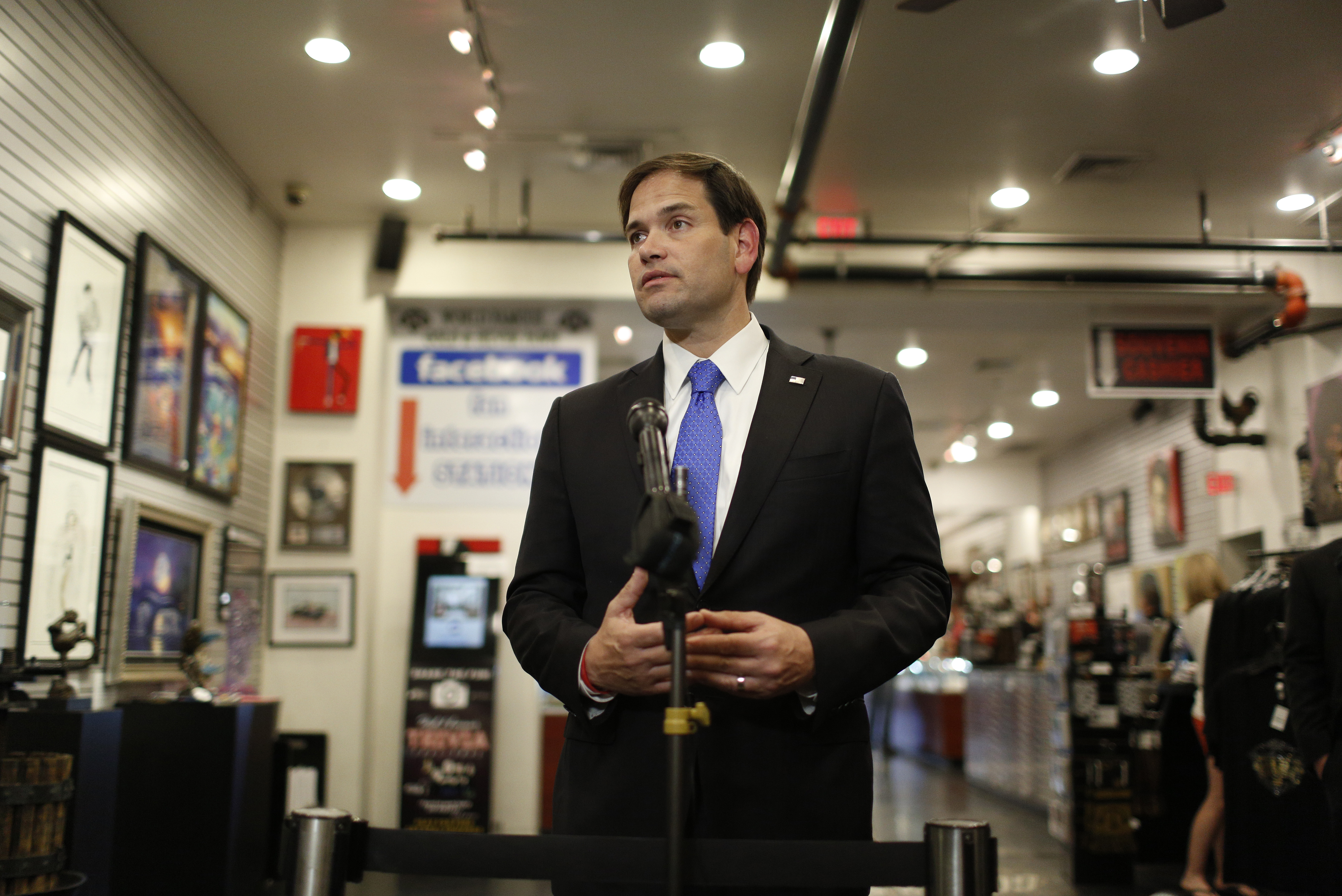Marco Rubio's shaky finances won't topple his campaign — unless there is more to the story
A New York Times report on Rubio's finances won't hurt him, but that doesn't mean he is in the clear

The New York Times has taken yet another swing at Marco Rubio. After dissecting the Florida senator and Republican presidential hopeful's driving record, the Gray Lady ran an expose on Rubio's finances.
Judging from the reactions even of people who are not Rubio supporters, both swings look like misses. The report that Rubio amassed four traffic violations since 1993 — the total number only becomes high when you include Rubio's wife — was mocked on Twitter under the hashtag #RubioCrimeSpree. This was soon followed, after the second report, by a hashtag #RubioSpendingSpree.
Rubio's campaign has raised money off both controversies. "The attack from The Times is just the latest in their continued hits against Marco and his family," spokesman Alex Conant said in a statement. "What The Times misses is that getting rich is not what has driven Senator Rubio's financial decisions."
The Week
Escape your echo chamber. Get the facts behind the news, plus analysis from multiple perspectives.

Sign up for The Week's Free Newsletters
From our morning news briefing to a weekly Good News Newsletter, get the best of The Week delivered directly to your inbox.
From our morning news briefing to a weekly Good News Newsletter, get the best of The Week delivered directly to your inbox.
While Rubio's driving was a mildly interesting human interest story at best, and a slightly silly attempt at a hit piece at worst, his finances are a more complicated matter. The Times story followed him from his late 20s, when fresh out of law school he began a political rise that always seemed a few steps behind his rise in net worth.
Rubio, the son of a bartender and a maid, got into debt, even though he periodically made good money as a lawyer, instructor, and author. He at one point owned multiple homes, with at least the first two bought with no money down. He saved little, bought an $80,000 boat, and had a political action committee that ran afoul of campaign finance law.
None of this is surprising. Rubio didn't always keep his political and personal spending as neatly separated as either prudence or the rules required. Ever since his 2010 campaign for Senate against Charlie Crist, there have been persistent rumors that Rubio's finances may derail him. It hasn't happened yet.
Why? Because while Rubio certainly lives comfortably, he isn't rich by Washington standards. It is difficult to argue that he has used public service to enrich himself when he is only now getting settled financially in his 40s and he still has fairly modest means. (Any significant interruption in his earnings would put that boat on sale faster than you can say New York Times.)
A free daily email with the biggest news stories of the day – and the best features from TheWeek.com
It is easy for Rubio to frame his money troubles as normal problems Americans go through, like student loan and mortgage debt, even if some of the sums involved are large and not everyone has access to company credit cards. Trying to connect this to what Rubio would do with government spending in office seems like a stretch, especially in light of his actual public record.
That's not to say that there aren't any legitimate concerns with the way Rubio mixed his personal and political spending. But there is nothing so significant that it would make anyone already inclined to vote for him decide to switch allegiances. And it probably wouldn't prevent many people from considering him.
Any Democratic readers who doubt this, ask yourself what it would take to keep you from voting for Hillary Clinton. After all, the former secretary of state's $225,000 speaking fees suggest she could buy herself a handful of Rubio's boats with just a couple of speeches.
One thing could change the significance of this story, however. Keep an eye on Norman Braman. The billionaire donor subsidized Rubio's job as a college instructor, hired him as a lawyer, and continues to employ Rubio's wife.
If Rubio's reliance on rich donors begins to look like patronage, and if any evidence emerges that there has been some kind of quid pro quo anywhere in the senator's past, that's when this can grow into an actual scandal.
People don't expect their politicians to be perfect. They do like to feel reasonably confident they aren't bought and paid for, a suspicion that skeptics of the current campaign finance system already harbor.
Rubio will emerge from these New York Times stories unscathed, perhaps even in a stronger position since it's always good for a Republican candidate to be at war with the media. But other reporters will presumably keep digging.
W. James Antle III is the politics editor of the Washington Examiner, the former editor of The American Conservative, and author of Devouring Freedom: Can Big Government Ever Be Stopped?.
-
 Washington grapples with ICE’s growing footprint — and future
Washington grapples with ICE’s growing footprint — and futureTALKING POINTS The deadly provocations of federal officers in Minnesota have put ICE back in the national spotlight
-
 ‘One day fentanyl will come back — and there will be little anyone can do’
‘One day fentanyl will come back — and there will be little anyone can do’Instant Opinion Opinion, comment and editorials of the day
-
 15 years after Fukushima, is Japan right to restart its reactors?
15 years after Fukushima, is Japan right to restart its reactors?Today’s Big Question Balancing safety fears against energy needs
-
 The billionaires’ wealth tax: a catastrophe for California?
The billionaires’ wealth tax: a catastrophe for California?Talking Point Peter Thiel and Larry Page preparing to change state residency
-
 Bari Weiss’ ‘60 Minutes’ scandal is about more than one report
Bari Weiss’ ‘60 Minutes’ scandal is about more than one reportIN THE SPOTLIGHT By blocking an approved segment on a controversial prison holding US deportees in El Salvador, the editor-in-chief of CBS News has become the main story
-
 Has Zohran Mamdani shown the Democrats how to win again?
Has Zohran Mamdani shown the Democrats how to win again?Today’s Big Question New York City mayoral election touted as victory for left-wing populists but moderate centrist wins elsewhere present more complex path for Democratic Party
-
 Millions turn out for anti-Trump ‘No Kings’ rallies
Millions turn out for anti-Trump ‘No Kings’ ralliesSpeed Read An estimated 7 million people participated, 2 million more than at the first ‘No Kings’ protest in June
-
 Ghislaine Maxwell: angling for a Trump pardon
Ghislaine Maxwell: angling for a Trump pardonTalking Point Convicted sex trafficker's testimony could shed new light on president's links to Jeffrey Epstein
-
 The last words and final moments of 40 presidents
The last words and final moments of 40 presidentsThe Explainer Some are eloquent quotes worthy of the holders of the highest office in the nation, and others... aren't
-
 The JFK files: the truth at last?
The JFK files: the truth at last?In The Spotlight More than 64,000 previously classified documents relating the 1963 assassination of John F. Kennedy have been released by the Trump administration
-
 'Seriously, not literally': how should the world take Donald Trump?
'Seriously, not literally': how should the world take Donald Trump?Today's big question White House rhetoric and reality look likely to become increasingly blurred
